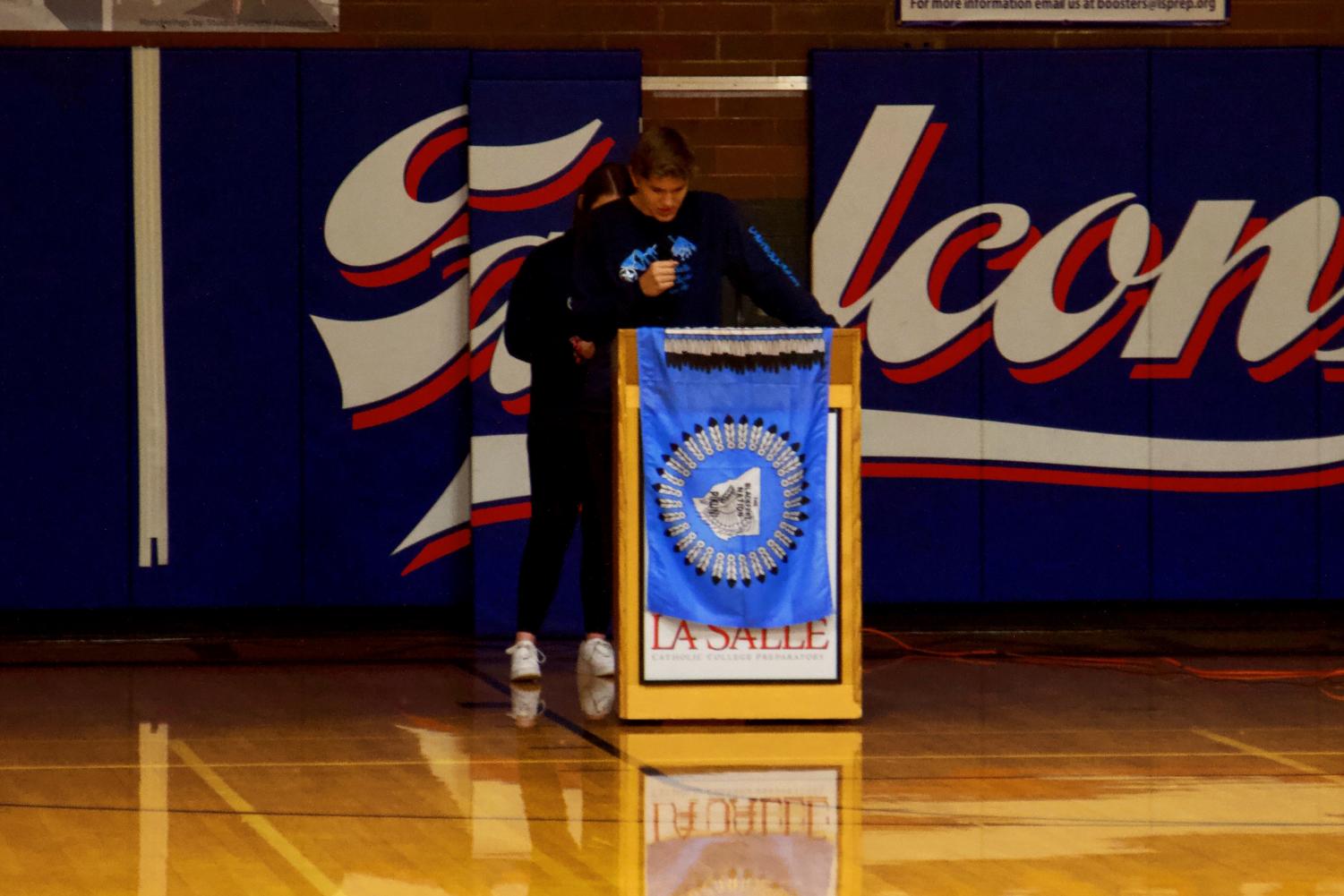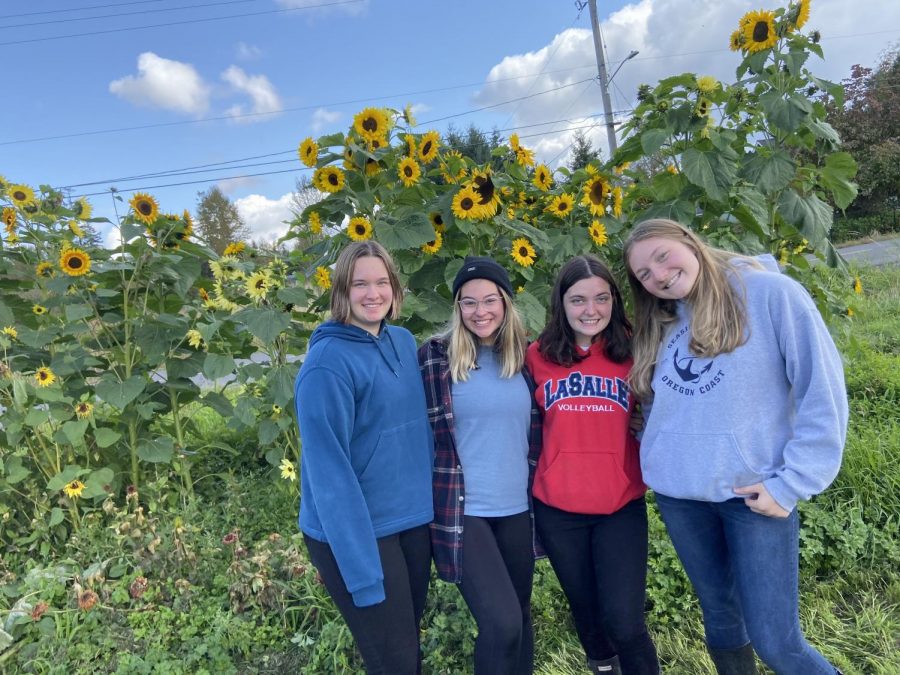Immersions Are Some of the Most Valuable Experiences Offered at La Salle
Juniors Payton Jefferis, Mary Grace Mott, Olivia Pisaneschi and Cami Gallawa attended the L’Arche immersion in Tacoma, Washington.
January 22, 2020
La Salle students are busy.
Our lives are dominated by at least seven classes, separated at predictable intervals by fleeting passing periods, breaks, and lunches. It’s a routine that slowly turns into monotony as we cycle through our responsibilities like clockwork.
After the final bell drones through the hallways, we still aren’t done. Homework for at least three classes, long term projects, sports practice, play rehearsals, weight lifting, speech and debate meetings, club meetings, meetings with teachers, and studying — you know the drill because we’re all living it.
This non-stop thrill ride of tedium results in La Salle students spending most of their waking life at school, thinking about school, or spending time with people that they know from school. There is a relatively small bubble of people who we can interact with consistently, and they are all having similar experiences to us.
This is why I consider immersions to be among the most valuable things that we have access to as students at La Salle.
You may wonder why spending several days in an unfamiliar location, away from the myriad of things that we “should” be doing, is a good idea.
Why isn’t it?
Let me frame this with the obvious fact that La Salle is a difficult school to get into and stay in. That’s the point. A college prep school that shelters its students from a rigorous academic process is not performing the service for which those students and their families have paid.
Those who have the means to attend this school are here because of the challenge it gives us. Growth as a student is required to stay at La Salle; growth comes from challenge, and challenge is found in abundance within our workload.
So what about growth as a person? La Salle offers opportunities for this as well, and given the nature of these opportunities, I would be more inclined to define them as obligations.
This is where immersions enter the picture. There are currently four immersions offered by La Salle, each one pertaining to an aspect of American life that most of us don’t experience; the Montana Blackfeet immersion, El Otro Lado border immersion, L’arche, and the homeless immersion.
Spending so much time in this school, with these people, can give a somewhat warped view of what American life is and should be. We can’t understand or even empathize with the struggles of other Americans without actively immersing ourselves in the lives of people who don’t have what we have — and maybe never will.
This lack of understanding leads to discomfort, and discomfort is the road to self-improvement. Our comfort zone exists to keep us safe, but it also holds us back from pushing our boundaries. Being a person is hard, but up here, in this beautiful echo chamber, there is always someone who has it harder than us.
However, I understand that not only is it difficult to be in an uncomfortable situation, but it’s hard to even imagine yourself in that situation. This aversion to controversial and multi-faceted situations should not keep us from exploring the outside world, but unfortunately it has done so on multiple occasions.
One example of this was an assembly on Nov. 15, when the student body of La Salle packed into the Brick Oven to hear the messages of thirteen seniors who traveled to the Lasallian school in Browning, Montana, on the Blackfeet Reservation.
One by one, the seniors came up to the mic and detailed the conditions of the reservation, the struggles of the students at the school, the nationwide disparity between life on the reservations and the lives of wealthier U.S. citizens.
Jonah Jutzi was the first to broach the topic of Native Americans being used as mascots. “Think about if any other race was used as a mascot,” Jutzi said. “These mascots are designed to portray Native Americans as savages and kitschy, cartoonish examples of real people.”

Jonah Jutzi who attended the Montana Blackfeet Immersion brought awareness to the topic of Native Americans being used as mascots.
“Many argue that the mascots are honorable; it is quite the opposite. They are in no way meant to be respectful or honor the native people,” Jutzi said. “Portraying their culture in this way dehumanizes them, and allows us to see them as less worthy of justice. We now have a short video talking more about this issue.”
The video began to play, but the spotty WiFi in the gym resulted in buffering. Ms. Sarah Maher, La Salle’s Director of Service and Dean of Women, started working to fix the problem. Technical problems during assemblies are, more often than not, met with applause and laughter — lighthearted responses to a common problem.
But this time it was different. There was no laughter. Just clapping. As the applause subsided, I overheard quiet voices from the senior section beside me expressing frustration and confusion as to why we were even watching this video in the first place. One called it “stupid.”
Someone else said, “Go Chiefs.”
And then on Jan. 10, the entire junior class, as well as a few sophomores, were seated in the cafeteria to listen to a presentation by seniors Gili Kaptur Dejesus and Abby Baines about the El Otro Lado Border Immersion. Among the topics discussed in the presentation were hot-button issues such as immigration and deportation.
During that presentation, Baines said something that has stuck with me ever since.
“You have the privilege to ignore this, but unfortunately this is many people’s lives,” Baines said.
When the presentation was over and my table began to applaud, I saw that there more than a few people throughout the cafeteria who were very pointedly not moving their hands. As the throngs of students filed by our table on their way to 7th period and lunch, I heard several voices using expletive-laced sentences to express how much they disagreed with the information that was presented to them.
What Baines said was absolutely correct.
La Salle students are not often forced to challenge the way they view the world in the same way that our classes force us to expand our intellect. Spending so much time around those with whom you agree on most, if not all, things can serve as a form of confirmation bias.
We need to challenge ourselves and what we believe in order to grow as people. If you have a belief that you consider to be intrinsic to yourself, inseparable from your being, and necessary for your identity, do the unthinkable and question it.
Expose yourself to ideas that stand in stark contrast to your own, because sensitive matters seldom deal in absolutes. The gray area between you and the person you disagree with is scarier than the disagreement itself. If you think there is a simple answer to a real-world issue, go on an immersion.






Giliana Kaptur Dejesus • Jan 22, 2020 at 10:02 pm
Super proud on how this turned out! Wonderful job to the entire Falconer team! And hopefully we can have more of those conversations even if it’s tough because discomfort is the only way to reach understanding